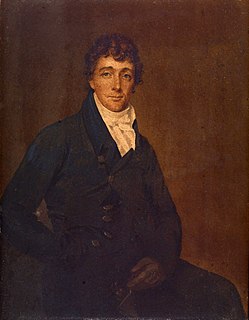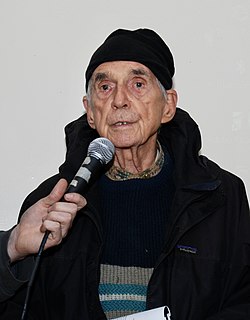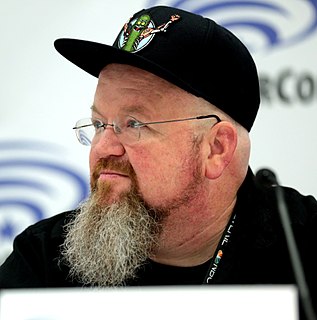A Quote by Edward Abbey
At some point we must draw a line across the ground of our home and our being, drive a spear into the land and say to the bulldozers, earthmovers, government and corporations, "thus far and no further." If we do not, we shall later feel, instead of pride, the regret of Thoreau, that good but overly-bookish man, who wrote, near the end of his life, "If I repent of anything it is likely to be my good behaviour.
Related Quotes
O! thus be it ever, when freemen shall stand Between their loved home and the war's desolation! Blest with victory and peace, may the heav'n rescued land Praise the Power that hath made and preserved us a nation. Then conquer we must, when our cause it is just, And this be our motto: 'In God is our trust.' And the star-spangled banner in triumph shall wave O'er the land of the free and the home of the brave!
Whatsoever is good for God's children they shall have it, for all is theirs to further them to heaven; therefore, if poverty be good, they shall have it; if disgrace be good, they shall have it; if crosses be good, they shall have them; if misery be good, they shall have it; for all is ours, to serve for our greatest good.
We are only safe when we wisely make use of all good advantages that we have access to. By going out of God's ways we go out of His government, and so lose our good frame of mind, and find ourselves overspread quickly with a contrary disposition. When we draw near to Christ (James 4:8), in His ordinances, He draws near to us.
One who knows not what his rights are can never know when they are taken and is unable to defend them. He is like a man who believes he owns a piece of ground which his neighbor also claims, but he doesn't know its boundaries. The neighbor continues to encroach further and further onto land he suspects is his, but since he is never certain where the boundary is, he cannot check the advance. Until he takes a firm position and says: "this far and no further," there is no line.
Corporations are a good thing. But corporations should not be running our government... They have driven the American economy since its founding, and the prosperity of our country is largely dependent on the free operation of corporations. But some corporations don't want free markets, and they don't want democracy. They want profits.
I dread our own power, and our own ambition; I dread our being too much dreaded... We may say that we shall not abuse this astonishing, and hitherto unheard-of-power. But every other nation will think we shall abuse it. It is impossible but that, sooner or later, this state of things must produce a combination against us which may end in our ruin.
Maybe that's what growing up means, in the end - you go far enough in the direction of - somewhere - and you realise that you've neutered the capacity of the term home to mean anything. [...] We don't get an endless number of orbits away from the place where meaning first arises, that treasure-house of first experiences. What we learn, instead, is that our adventures secure us in our isolation. Experience revokes our licence to return to simpler times. Sooner or later, there's no place remotely like home.
There are two angels that attend unseen
Each one of us, and in great books record
Our good and evil deeds. He who writes down
The good ones, after every action closes
His volume, and ascends with it to God.
The other keeps his dreadful day-book open
Till sunset, that we may repent; which doing,
The record of the action fades away,
And leaves a line of white across the page.
Now if my act be good, as I believe it,
It cannot be recalled. It is already
Sealed up in heaven, as a good deed accomplished.
The rest is yours.
I testify to you that God's hand has been in our destiny. I testify that freedom as we know it today is being threatened as never before in our history. I further witness that this land-the Americas-must be protected, its Constitution upheld, for this is a land foreordained to be the Zion of our God. He expects us as members of the Church and bearers of His priesthood to do all we can to preserve our liberty.
For me, the times I always regret are missed opportunities to say farewell to good people, to wish them long life and say to them in all sincerity, "You build and do not destroy; you sow goodwill and reap it; smiles bloom in the wake of your passing, and I will keep your kindness in trust and share it as occasion arises, so that your life will be a quenching draught of calm in a land of drought and stress." Too often I never get to say that when it should be said. Instead, I leave them with the equivalent of a "Later, dude!" only to discover there would be no later for us.
Now we cannot...discover our failure to keep God's law except by trying our very hardest (and then failing). Unless we really try, whatever we say there will always be at the back of our minds the idea that if we try harder next time we shall succeed in being completely good. Thus, in one sense, the road back to God is a road of moral effort, of trying harder and harder. But in another sense it is not trying that is ever going tobring us home. All this trying leads up to the vital moment at which you turn to God and say, "You must do this. I can't.
If there is some end of the things we do, which we desire for its own sake, clearly this must be the good. Will not knowledge of it, then, have a great influence on life? Shall we not, like archers who have a mark to aim at, be more likely to hit upon what we should? If so, we must try, in outline at least, to determine what it is.
Pride was his life force; for us it was a live nerve that he could teach us to brush. One stroke, a good practice, and we could tingle for days ... First, he found the pride in each of us, then he taught us how good it could feel. What he was ultimately after was for every one of us to learn to light our own fires and glow our brightest.

































